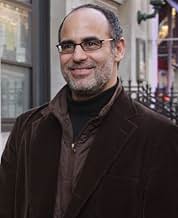NOTE IMDb
6,9/10
3,4 k
MA NOTE
Une doctorante ambitieuse convainc un écrivain que sa thèse peut relancer sa carrière.Une doctorante ambitieuse convainc un écrivain que sa thèse peut relancer sa carrière.Une doctorante ambitieuse convainc un écrivain que sa thèse peut relancer sa carrière.
- Réalisation
- Scénario
- Casting principal
- Récompenses
- 3 victoires et 11 nominations au total
Avis à la une
Some writers receive early praise in their careers. Some even more talented ones never get their due because their work is not commercially satisfactory. In fact, it could be said that fame eludes a lot of brilliant authors who, as in the case of Leonard Schiller, must resort to a life of teaching in the great universities of the country. Schiller has only produced four novels, which sadly, seem to be out of print and unappreciated by even serious readers.
It is at this juncture of Leonard's life that a change occurs. When the eager young Heather, who wants to base her thesis on his books, comes to visit to ask if it could be possible to enlist him to help her with her paper. Leonard Schiller feels flattered and repulsed at the same time. He is a private man who has shunned notoriety and wants to stay that way, but ends up in going along with the young woman.
Leonard, a widower, has a daughter, Ariel, a woman in her early forties who believes her biological clock is running out of time if she is to have a baby. She had wanted to have a child with Casey, who doesn't cherish the thought of fatherhood and had broken with her. When he reappears, they renew their relationship with mixed results because Casey can't commit. This disparity is pointed out to Ariel by her father, who feels she is not getting her due.
Heather, we see moving closer and closer to Leonard. It appears inevitable they are headed for an involvement, one that he feels is more than what he wanted to get, especially with a woman way too young for him. The intensity of the feeling she provokes in him, surprises Schiller, who is in ill health, but he gives way to his fears jumping into an affair which will prove will not benefit either one of them.
"Starting Early in the Evening" is a small triumph for the team behind it, notably for director Andrew Wagner who gives the light touch the story requires. The film which is based on a Brian Morton book, which we haven't read, translates beautifully for the screen.
Frank Langella is simply marvelous playing Leonard Schiller. He is worth the price of admission. Obviously, the actor knows well how the character he is playing reacts to all the new sensations he discovers at a late age when the young woman comes into his life. Mr. Langella has never been better and more effective as he is in here. His take on this forgotten scholar is right on target.
Lauren Ambrose, whose work we have admired before, makes quite a case with her Heather. She is an eager young woman who probably has no intention of falling in love with the older man, yet, in her admiration for the author, she leaps into a serious situation that might not mean anything to her, yet, it has given Leonard a new taste in life.
Lily Taylor's Ariel is a complicated character. As the daughter, she is protective, yet, she ends up accepting a woman, much younger than her to be her father's lover. At the same time, her own life is in turmoil because of the motherhood she feels is denied to her. The brilliant Adrian Lester and Jessica Hecht add to the enjoyment of the film.
The film has a foreign film feeling to it. Andrew Wagner shows a sure hand in the final product and one can only wish him to continue along this way because he shows that he has talent and an eye for bringing out those hidden emotions in this interesting film.
It is at this juncture of Leonard's life that a change occurs. When the eager young Heather, who wants to base her thesis on his books, comes to visit to ask if it could be possible to enlist him to help her with her paper. Leonard Schiller feels flattered and repulsed at the same time. He is a private man who has shunned notoriety and wants to stay that way, but ends up in going along with the young woman.
Leonard, a widower, has a daughter, Ariel, a woman in her early forties who believes her biological clock is running out of time if she is to have a baby. She had wanted to have a child with Casey, who doesn't cherish the thought of fatherhood and had broken with her. When he reappears, they renew their relationship with mixed results because Casey can't commit. This disparity is pointed out to Ariel by her father, who feels she is not getting her due.
Heather, we see moving closer and closer to Leonard. It appears inevitable they are headed for an involvement, one that he feels is more than what he wanted to get, especially with a woman way too young for him. The intensity of the feeling she provokes in him, surprises Schiller, who is in ill health, but he gives way to his fears jumping into an affair which will prove will not benefit either one of them.
"Starting Early in the Evening" is a small triumph for the team behind it, notably for director Andrew Wagner who gives the light touch the story requires. The film which is based on a Brian Morton book, which we haven't read, translates beautifully for the screen.
Frank Langella is simply marvelous playing Leonard Schiller. He is worth the price of admission. Obviously, the actor knows well how the character he is playing reacts to all the new sensations he discovers at a late age when the young woman comes into his life. Mr. Langella has never been better and more effective as he is in here. His take on this forgotten scholar is right on target.
Lauren Ambrose, whose work we have admired before, makes quite a case with her Heather. She is an eager young woman who probably has no intention of falling in love with the older man, yet, in her admiration for the author, she leaps into a serious situation that might not mean anything to her, yet, it has given Leonard a new taste in life.
Lily Taylor's Ariel is a complicated character. As the daughter, she is protective, yet, she ends up accepting a woman, much younger than her to be her father's lover. At the same time, her own life is in turmoil because of the motherhood she feels is denied to her. The brilliant Adrian Lester and Jessica Hecht add to the enjoyment of the film.
The film has a foreign film feeling to it. Andrew Wagner shows a sure hand in the final product and one can only wish him to continue along this way because he shows that he has talent and an eye for bringing out those hidden emotions in this interesting film.
Movies about literary people too often sound like books rather than movies. The way characters talk doesn't jive with the way people actually sound in real life. Dialogue sounds scripted, phrases and speeches are too well put together.
This is a trap "Starting Out in the Evening" doesn't avoid, but it's easy to overlook that minor flaw, as the rest of the film is intelligent and thoughtful. The main reason to watch is Frank Langella, playing Leonard Schiller, an aging novelist who the world has forgotten and who is tempted to hope that his name might be revived by an idolatrous grad student who wants to do her thesis on his work. The grad student (Lauren Ambrose) is pushy and rather unlikable, but it makes sense that Leonard would take to her, as only someone as pushy as she could break through his reclusive facade. The relationship these two embark upon is complicated to say the least, and both actors navigate the tricky terrain well.
A subplot involves Leonard's daughter (played by Lili Taylor, who it was a pleasure to see again) and her rekindled relationship with a man of whom Leonard does not approve (Adrian Lester).
"Starting Out in the Evening" is one of those ultra-sombre movies that takes place in the dead of winter, when everything is cold and dead, and in which the predominant color scheme is brown and gray. But the cast brings enough vitality to the film, and the screenplay is unpredictable enough, that the end product is engaging rather than depressing.
Grade: A-
This is a trap "Starting Out in the Evening" doesn't avoid, but it's easy to overlook that minor flaw, as the rest of the film is intelligent and thoughtful. The main reason to watch is Frank Langella, playing Leonard Schiller, an aging novelist who the world has forgotten and who is tempted to hope that his name might be revived by an idolatrous grad student who wants to do her thesis on his work. The grad student (Lauren Ambrose) is pushy and rather unlikable, but it makes sense that Leonard would take to her, as only someone as pushy as she could break through his reclusive facade. The relationship these two embark upon is complicated to say the least, and both actors navigate the tricky terrain well.
A subplot involves Leonard's daughter (played by Lili Taylor, who it was a pleasure to see again) and her rekindled relationship with a man of whom Leonard does not approve (Adrian Lester).
"Starting Out in the Evening" is one of those ultra-sombre movies that takes place in the dead of winter, when everything is cold and dead, and in which the predominant color scheme is brown and gray. But the cast brings enough vitality to the film, and the screenplay is unpredictable enough, that the end product is engaging rather than depressing.
Grade: A-
It should come as no surprise that this quietly affecting character study barely left a trace in theaters last year since movies about literature and the writing process are hardly fodder for young teenaged boys looking for outsized CGI-saturated extravaganzas. However, co-writer/director Andrew Wagner's ("The Talent Given Us") sophomore effort benefits immeasurably from Frank Langella's deeply nuanced performance as a once-renowned novelist long forgotten and facing his own mortality as he attempts to finish a valedictorian work ten years in development. With his recognizably sonorous voice and intensely watchful manner, the 68-year-old actor has never been known for playing sympathetic roles, but he seizes the heart of a becalmed man so engulfed in the creative process that he reacts to any intrusion upon it with a subtle, leonine fury. It's been nearly four decades since his film debut as the egotistical, caddish writer in Frank Perry's "Diary of a Mad Housewife", but what a treat to see him bookend that performance with this one.
Langella portrays New York-based Leonard Schiller, whose four published novels have been out of print for years. In declining health, Schiller tries to interest a publisher friend in his latest, yet-to-be-completed novel, but he is told there is no market for literary-type novels. Precipitously, an enthusiastic graduate student named Heather Wolfe walks into Schiller's intensely private life to request a series of interviews for a masters thesis she wants to write about him. She is such an unabashed fan that her goal is no less than having Schiller rediscovered. The author is initially resistant, but he wears down under her coquettish persistence. At the same time, Schiller's self-loathing daughter Ariel has grown up being used to playing second-fiddle to her father's work. Single and closing in on forty, she hears her biological clock ticking as she resuscitates an embattled relationship with her estranged lover Casey, who is equally vehement about not having children. The plot threads eventually mesh when Schiller opens up to Heather and realizes how dormant he has kept his feelings since his wife's death over two decades earlier.
Beyond Langella is a trio of solid performances though none nearly as impressive as his. Lauren Ambrose ("Six Feet Under") captures Heather's youthful vigor and innate intelligence, but I found her use of Lolita-style wiles to be a bit mechanical within the scheme of the storyline. Always worth watching, Lili Taylor is on pretty familiar territory as the conflicted Ariel, but she manages to bring her likeably neurotic manner to the role. I haven't seen Adrian Lester since Mike Nichols' "Primary Colors", but he's a welcome addition here as the slow-to-evolve Casey, especially in a tense small-talk scene with Schiller during Ariel's birthday celebration. In fact, much of the dialogue by Wagner and co-writer Fred Parnes has a smart, insightful quality that doesn't call undue attention to the intellectual observations of the characters. Even more, their strong screenplay makes the series of rude awakenings toward the end resonate with a combination of heart and necessary harshness. The 2008 DVD is short on extras - Wagner's thoughtful commentary and the theatrical trailer - but this small-scale film is well worth discovering, especially to see Langella at the very top of his game.
Langella portrays New York-based Leonard Schiller, whose four published novels have been out of print for years. In declining health, Schiller tries to interest a publisher friend in his latest, yet-to-be-completed novel, but he is told there is no market for literary-type novels. Precipitously, an enthusiastic graduate student named Heather Wolfe walks into Schiller's intensely private life to request a series of interviews for a masters thesis she wants to write about him. She is such an unabashed fan that her goal is no less than having Schiller rediscovered. The author is initially resistant, but he wears down under her coquettish persistence. At the same time, Schiller's self-loathing daughter Ariel has grown up being used to playing second-fiddle to her father's work. Single and closing in on forty, she hears her biological clock ticking as she resuscitates an embattled relationship with her estranged lover Casey, who is equally vehement about not having children. The plot threads eventually mesh when Schiller opens up to Heather and realizes how dormant he has kept his feelings since his wife's death over two decades earlier.
Beyond Langella is a trio of solid performances though none nearly as impressive as his. Lauren Ambrose ("Six Feet Under") captures Heather's youthful vigor and innate intelligence, but I found her use of Lolita-style wiles to be a bit mechanical within the scheme of the storyline. Always worth watching, Lili Taylor is on pretty familiar territory as the conflicted Ariel, but she manages to bring her likeably neurotic manner to the role. I haven't seen Adrian Lester since Mike Nichols' "Primary Colors", but he's a welcome addition here as the slow-to-evolve Casey, especially in a tense small-talk scene with Schiller during Ariel's birthday celebration. In fact, much of the dialogue by Wagner and co-writer Fred Parnes has a smart, insightful quality that doesn't call undue attention to the intellectual observations of the characters. Even more, their strong screenplay makes the series of rude awakenings toward the end resonate with a combination of heart and necessary harshness. The 2008 DVD is short on extras - Wagner's thoughtful commentary and the theatrical trailer - but this small-scale film is well worth discovering, especially to see Langella at the very top of his game.
7riid
I saw this film at the 2007 Toronto International Film Festival.
Starting Out in the Evening is based on the novel by Brian Morton, and stars Frank Langella in an understated role as Leonard Schiller, a once great novelist and now-retired literary professor. His previous books now long out-of-print, Leonard is struggling to finish his latest novel, a decade and counting in the making. Further distracting him from his novel is his genial but occasionally strained relationship with his daughter Ariel (Lily Taylor), who is nearing 40 and wanting a baby, but stuck back in a relationship with her ex-boyfriend Casey (Adrian Lester), who is most decidedly against the idea.
Another complication comes in the form of a young grad student, Heather (Lauren Ambrose), who has made Leonard the subject of her master's thesis. Heather is determined to discover the overriding theme in Schiller's work, the early part of which inspired her to pursue her dreams in college. The conversations that Leonard and Heather have cover the gamut of literary criticism and the creative process, touching on issues such as whether an author's personal life should inform their work, and whether an author can be pigeonholed into a single thematic thread.
As Leonard becomes more invested in Heather, these themes end up leading all the characters reaching pivotal decisions in their lives, paralleling the thrust of Leonard's early work around personal freedom.
Langella gives a fine performance as Leonard, who sees his time running out, and wonders if he has enough time, energy, and creativity left to finish one last book. Lauren Ambrose leaves Six Feet Under behind her as Heather, a driven but self-centered woman who wants to fit Leonard's books into her own preconceived notions and feelings, dismissing as less important those that don't fit the mold.
Lily Taylor was great as Ariel, a woman wanting the closeness and depth of relationship that she can't get from her father, so much so that she is willing to subordinate her own wants and needs. Adrian Lester plays Casey as the exact opposite of Ariel, a man who enjoys his relationship with Ariel, but not at the expense of his own dreams. Ariel doesn't come across as a victim; there's a hint of strength under the surface. And Casey doesn't come across as a complete jerk; there's a genuine love there that he doesn't fully appreciate.
All-in-all, Starting Out in the Evening ends up the night as an enjoyable movie, with good performances all around.
Starting Out in the Evening is based on the novel by Brian Morton, and stars Frank Langella in an understated role as Leonard Schiller, a once great novelist and now-retired literary professor. His previous books now long out-of-print, Leonard is struggling to finish his latest novel, a decade and counting in the making. Further distracting him from his novel is his genial but occasionally strained relationship with his daughter Ariel (Lily Taylor), who is nearing 40 and wanting a baby, but stuck back in a relationship with her ex-boyfriend Casey (Adrian Lester), who is most decidedly against the idea.
Another complication comes in the form of a young grad student, Heather (Lauren Ambrose), who has made Leonard the subject of her master's thesis. Heather is determined to discover the overriding theme in Schiller's work, the early part of which inspired her to pursue her dreams in college. The conversations that Leonard and Heather have cover the gamut of literary criticism and the creative process, touching on issues such as whether an author's personal life should inform their work, and whether an author can be pigeonholed into a single thematic thread.
As Leonard becomes more invested in Heather, these themes end up leading all the characters reaching pivotal decisions in their lives, paralleling the thrust of Leonard's early work around personal freedom.
Langella gives a fine performance as Leonard, who sees his time running out, and wonders if he has enough time, energy, and creativity left to finish one last book. Lauren Ambrose leaves Six Feet Under behind her as Heather, a driven but self-centered woman who wants to fit Leonard's books into her own preconceived notions and feelings, dismissing as less important those that don't fit the mold.
Lily Taylor was great as Ariel, a woman wanting the closeness and depth of relationship that she can't get from her father, so much so that she is willing to subordinate her own wants and needs. Adrian Lester plays Casey as the exact opposite of Ariel, a man who enjoys his relationship with Ariel, but not at the expense of his own dreams. Ariel doesn't come across as a victim; there's a hint of strength under the surface. And Casey doesn't come across as a complete jerk; there's a genuine love there that he doesn't fully appreciate.
All-in-all, Starting Out in the Evening ends up the night as an enjoyable movie, with good performances all around.
STARTING OUT IN THE EVENING is a quietly moving work of art, a film adapted from Brian Morton's novel by screenwriters Fred Parnes and Andrew Wagner and directed by Andrew Wagner that dares to take us to the wall with decisions we make about how we conduct our lives and negotiate the changes that can either be stumbling blocks or stimuli for creative awareness, It has much to say about the creative process of writing, a theme upon which it first appears to be based, but it more importantly urges us to examine how we live - how we make use of this moment of time in which we inhabit a body in the universe.
Leonard Schiller (in an extraordinarily understated performance by Frank Langella) is an aging author, a man whose first two novels seem to set the literary world on fire, but whose next two novels languished on the shelves and slipped into the same plane of obscurity Schiller finds his life since the death of hi wife. He has a daughter Ariel (Lili Taylor in another richly hued performance) who is nearing age forty and is unable to bond permanently with a man because of her obsession with having children before her biological clock ticks past fertility. Into their lives comes Heather Wolfe (Lauren Ambrose), a bright young graduate student who has elected to write her master's thesis on the works of Leonard Schiller. Schiller is absorbed in writing what may be his last novel and can't be bothered with Heather's plea for a series of interviews. But curiosity intervenes and soon heather and Leonard are involved in the process of interviewing, a process which gradually builds into overtones of heather' physical as well as intellectual attraction to Leonard. Meanwhile Ariel observes the process that seems to be infusing life into her father and encourages her to exit her current relationship with Victor (Michael Cumpsty) and re-connect with the true love of her life Casey (Adrian Lester), a man she loves but who refuses to give her the children she so desperately wants. The manner in these characters interact and learn from each other the importance of sharing Life instead of obsessing with selfish goals brings the drama to a rather open-ended close, another factor that makes this story significantly better than most themes of May-December romance and unilateral coping with self centered directions.
The pleasures of this film are many, but among the finest is the quality of acting by Langella, Taylor, Ambrose, and Lester. In many ways the story is a parallax of views of life as art that subtly intertwine like a fine string quartet. Why this film was ignored by the Oscars only suggests that movies for the mind take second place to movies for the merriment of entertainment. For people who enjoy the challenge of a meaty story, this film is a must. Grady Harp
Leonard Schiller (in an extraordinarily understated performance by Frank Langella) is an aging author, a man whose first two novels seem to set the literary world on fire, but whose next two novels languished on the shelves and slipped into the same plane of obscurity Schiller finds his life since the death of hi wife. He has a daughter Ariel (Lili Taylor in another richly hued performance) who is nearing age forty and is unable to bond permanently with a man because of her obsession with having children before her biological clock ticks past fertility. Into their lives comes Heather Wolfe (Lauren Ambrose), a bright young graduate student who has elected to write her master's thesis on the works of Leonard Schiller. Schiller is absorbed in writing what may be his last novel and can't be bothered with Heather's plea for a series of interviews. But curiosity intervenes and soon heather and Leonard are involved in the process of interviewing, a process which gradually builds into overtones of heather' physical as well as intellectual attraction to Leonard. Meanwhile Ariel observes the process that seems to be infusing life into her father and encourages her to exit her current relationship with Victor (Michael Cumpsty) and re-connect with the true love of her life Casey (Adrian Lester), a man she loves but who refuses to give her the children she so desperately wants. The manner in these characters interact and learn from each other the importance of sharing Life instead of obsessing with selfish goals brings the drama to a rather open-ended close, another factor that makes this story significantly better than most themes of May-December romance and unilateral coping with self centered directions.
The pleasures of this film are many, but among the finest is the quality of acting by Langella, Taylor, Ambrose, and Lester. In many ways the story is a parallax of views of life as art that subtly intertwine like a fine string quartet. Why this film was ignored by the Oscars only suggests that movies for the mind take second place to movies for the merriment of entertainment. For people who enjoy the challenge of a meaty story, this film is a must. Grady Harp
Le saviez-vous
- AnecdotesStu Richel played the husband of Jill Eikenberry in a scene with her former lover, played by Frank Langella. The Jill-Frank relationship was thought not to be "central to the spine of the story" and was dropped in the final cut.
- GaffesWhen Ariel wears her t-shirt in close-up shots, her necklace switches back and forth between hanging outside the shirt and mostly hidden under the shirt.
- Citations
Leonard Schiller: Freedom isn't the choice the world encourages. You have to wear a suit of armor to defend it.
- Bandes originalesSynchronicity
Written by Tameca Jones, Alex Biko, Brent Marley, Robert Belt and Jason White
Performed by 8 Million Stories
Courtesy of RipTide Music
Meilleurs choix
Connectez-vous pour évaluer et suivre la liste de favoris afin de recevoir des recommandations personnalisées
- How long is Starting Out in the Evening?Alimenté par Alexa
Détails
- Date de sortie
- Pays d’origine
- Site officiel
- Langue
- Aussi connu sous le nom de
- Начиная вечером
- Lieux de tournage
- Upper West Side, Manhattan, Ville de New York, New York, États-Unis(Leonard sits on the bench in front of 201 W 83rd St, when Leonard has indigestion while walking with Heather.)
- Sociétés de production
- Voir plus de crédits d'entreprise sur IMDbPro
Box-office
- Montant brut aux États-Unis et au Canada
- 898 786 $US
- Week-end de sortie aux États-Unis et au Canada
- 76 214 $US
- 25 nov. 2007
- Montant brut mondial
- 898 786 $US
- Durée1 heure 51 minutes
- Couleur
- Mixage
- Rapport de forme
- 1.85 : 1
Contribuer à cette page
Suggérer une modification ou ajouter du contenu manquant

Lacune principale
What is the Spanish language plot outline for Starting Out in the Evening (2007)?
Répondre
































